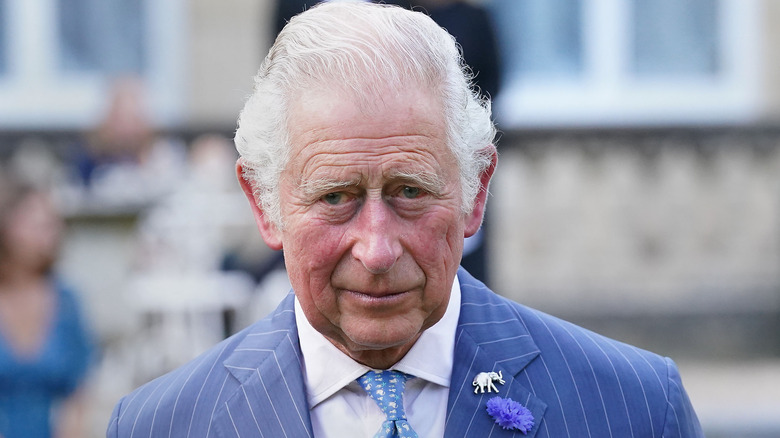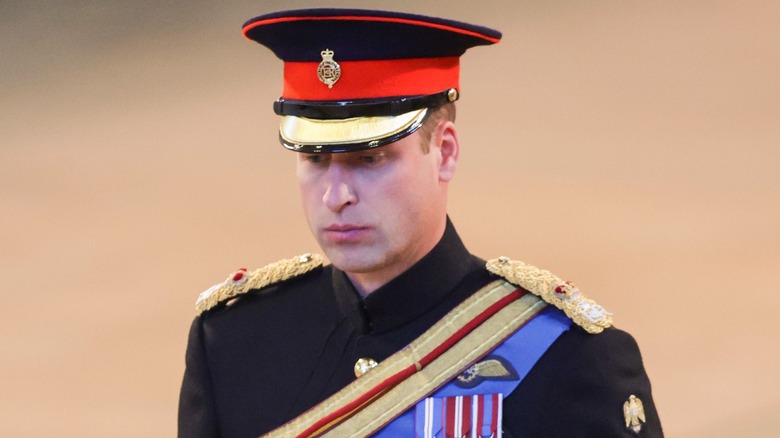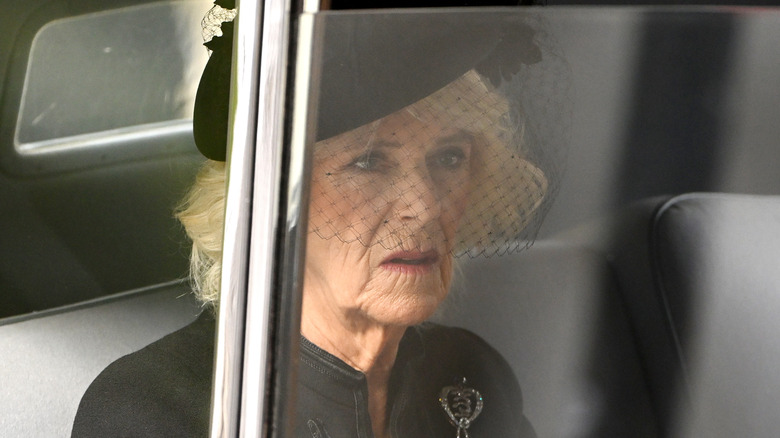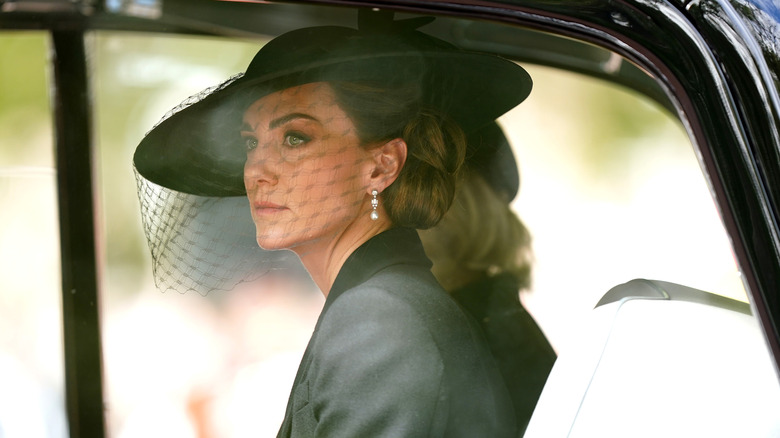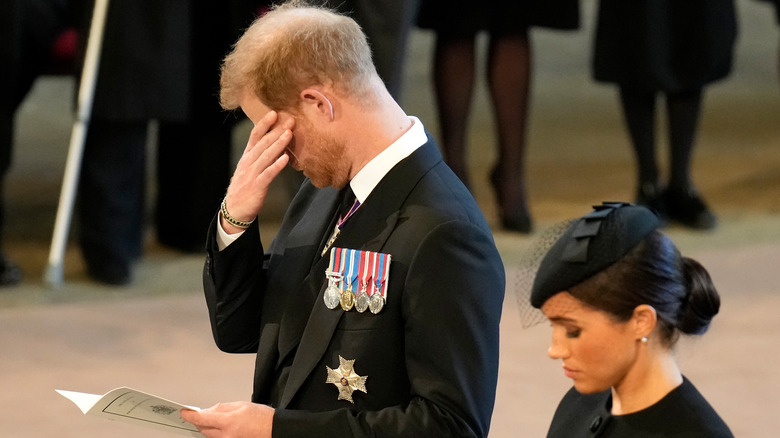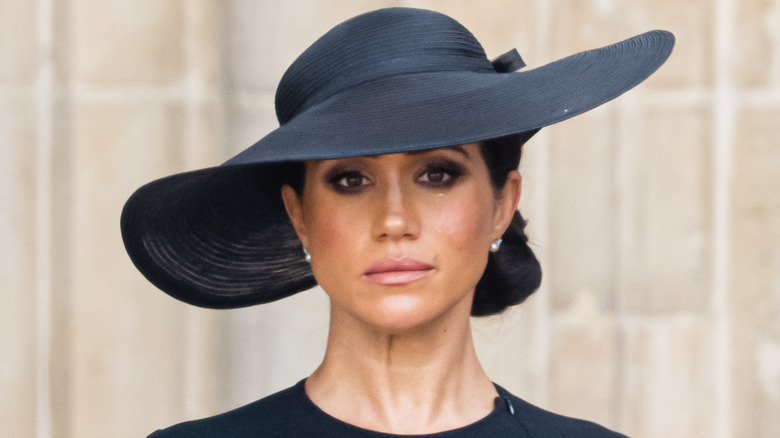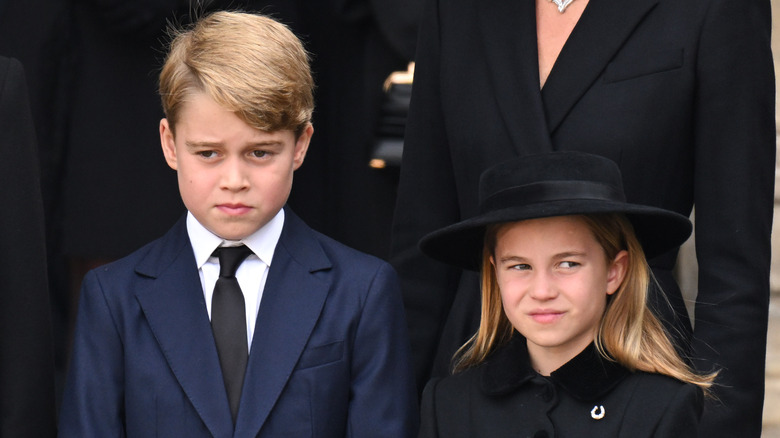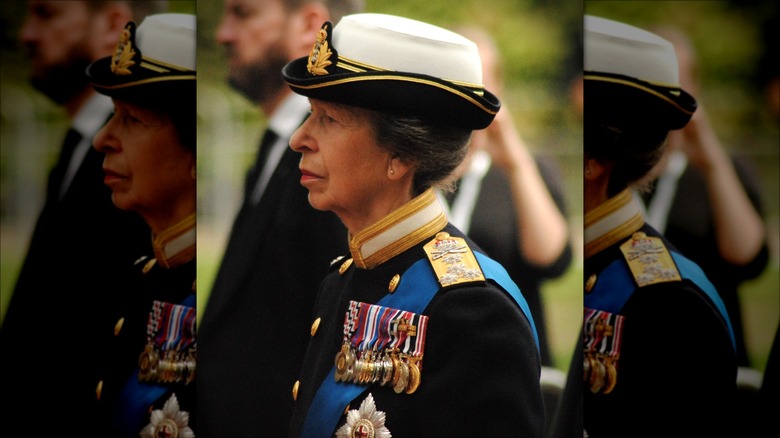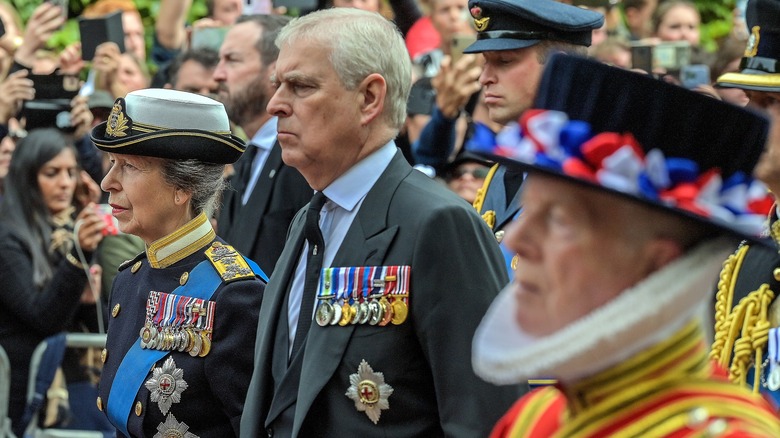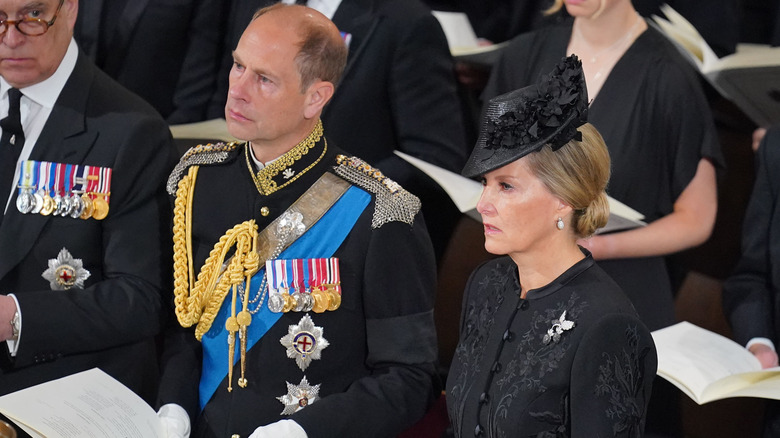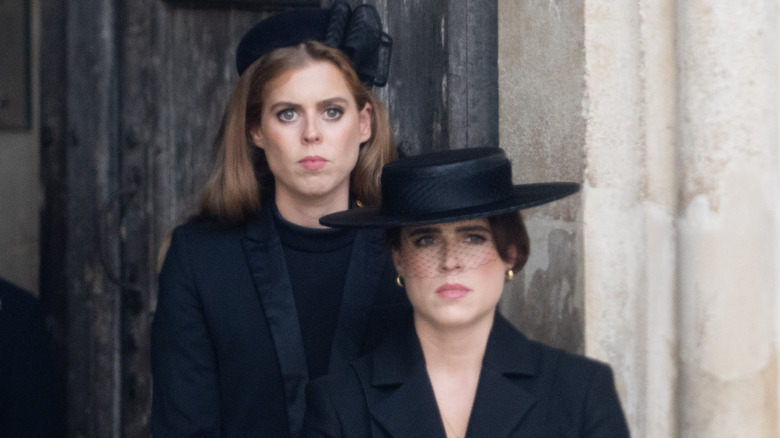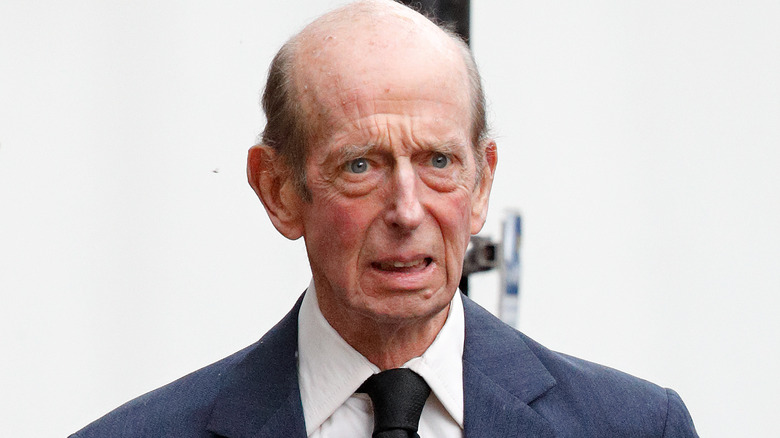What Each Royal's Role Could Be In King Charles' Funeral
Though Queen Elizabeth II reigned for 70 years, effectively shaping the modern monarchy, her son undoubtedly won't enjoy comparable longevity. Indeed, Elizabeth's life was generally free from illness, her health only starting to decline in her mid-90s following a bout of COVID-19 and an alleged bone marrow cancer diagnosis. However, King Charles III's heartbreaking cancer diagnosis in February 2024 came at the age of 75, which is relatively young considering that both his parents lived a few years shy of their centenaries.
Subsequently, the king's cancer health crisis and ongoing treatment have led to significant speculation about Charles' future on the throne, as well as anxiety for his successors. "Charles's cancer has put William and Catherine in frightening proximity to ascending the throne just when they had hoped for a span of years to parent their children out of the public eye," royal expert Tina Brown wrote in The New York Times. "The prospect of it, I am told, is causing them intense anxiety." With His Majesty's future in the firm clouded by uncertainty, let's take a look at what each royal's role could be in King Charles' funeral.
Prince William will lead the funeral procession and lay important mementos on his father's coffin
When King Charles III dies, Prince William will immediately become king. As reigning monarch, he'll play a pivotal role in his father's funeral. Though Charles' death plan, Operation Menai Bridge, differs slightly from Queen Elizabeth's, much of the same protocol with regard to funeral arrangements will remain. Sources who spoke to The Daily Beast in April 2024 claimed funeral arrangements for Charles had already been updated, with the king reportedly sicker than he's been letting on. "The plans have been dusted off and are actively being kept up to date," an insider explained. "It's no more than what you would expect given the king has been diagnosed with cancer."
When Elizabeth died, a solemn Charles led the funeral procession. Accordingly, William is also likely to lead the funeral procession, being both King of the United Kingdom and the grieving eldest son.
Furthermore, at Elizabeth's funeral, Charles made a number of moving gestures honoring his mother. For instance, he laid a handwritten note on her coffin, which read "In loving and devoted memory, Charles R," per the BBC. It's probable William will be tasked with penning a tribute to his late father. Significantly, Charles also placed the queen's red flag, the Company Camp Colour of the Grenadier Guards, on her coffin. Since the queen's death, Charles was given his own flag, which William will be responsible for placing with his father's casket when he dies.
Queen Camilla may leave flowers from her husband's garden on his coffin
Since King Charles III's cancer diagnosis, Camilla, Queen Consort, has been praised for stepping up for a seemingly endless succession of royal duties, all while supporting her husband in his time of need. But if the king dies, her role within the monarchy will immediately diminish. However, Camilla, who will then be known as Queen Dowager, will still play a vital role in her husband's funeral.
The funeral will provide Camilla with an opportunity to commemorate Charles' eccentric personality. The king is famed for his passion for plants and has even been known to speak to them. His love of gardening, which Camilla shares, will likely manifest in his funeral arrangements. For instance, when Charles' grandfather, King George VI, died in 1952 his widow, Queen Elizabeth, The Queen Mother, laid a wreath on his coffin. Similarly, a bouquet of flowers picked from the gardens of Buckingham Palace was placed on Queen Elizabeth II's resting place 70 years later.
In Charles' case, his widow may wish to lay flowers from his treasured garden on his coffin as a sweet tribute to his passion for horticulture. These could be flowers picked from the gardens of Clarence House, the king's official residence. Unlike Prince William, who will no doubt lead his father's funeral procession, the grieving Camilla will likely follow the coffin in a car, as The Queen Mother did when King George died.
Princess Catherine will have to sing God Save the King to her husband
During Queen Elizabeth II's funeral, there was a slightly toe-curling moment in which mourners — King Charles III's wife included — had to sing "God Save the King," with many accidentally uttering "queen." Camilla, Queen Consort, was seen looking somewhat awkward as she sang the words to her own husband. At Charles' funeral, Princess Catherine will also have to sing "God Save the King" to her newly throned husband, which may feel rather surreal.
Catherine, who will become queen consort when Prince William ascends the throne, is expected to arrive at the funeral in a car with her children and mother-in-law, Camilla. She will then join her husband in walking behind the coffin, as Camilla did with Charles at the queen's memorial.
The future queen consort's role will largely revolve around supporting her bereaved husband. When King George VI died, for instance, Prince Philip remained loyally by the queen's side, ensuring he didn't overshadow the mourning monarch. Likewise, Camilla comforted Charles as he was seemingly overcome by grief at the 2021 funeral of his father, Philip.
Prince Harry will be in the funeral procession, but won't be allowed to salute
Although Prince Harry and Prince William's relationship remains frosty at best, there's no doubt that the former will want to return to the U.K. to pay his respects to his late father when he dies. Harry is expected to join the funeral procession along with his brother, William. This follows royal tradition, with Queen Elizabeth II's four children — King Charles III, Princess Anne, Prince Andrew, and Prince Edward — leading the procession at Her Majesty's funeral in 2023. The queen's children also held a vigil at her coffin, observing 10 minutes of silence, which William and Harry are also expected to do at Charles' funeral.
Despite playing a significant role in the funeral, Harry may have to leave his military garb at home. He was initially barred from wearing his uniform at his grandmother's funeral because such attire is reserved for working royals. Charles later allowed his youngest son to wear his uniform, but Harry opted not to, noting that the funeral was about honoring his grandmother and nothing more. He did, however, wear his medals. In all probability, he will make a similarly understated appearance at his father's funeral. Furthermore, he will be unable to join a salute to his late dad and will give a respectful bow instead; again, this is due to Harry stepping down from royal duties and thus being stripped of military titles.
Due to bad blood, Meghan Markle may not be invited to proceedings
Prince William and Meghan Markle's relationship has been strained ever since the latter married into the House of Windsor. According to bombshell revelations in Prince Harry's memoir, "Spare," William viewed Meghan as an interloper from the outset and allegedly reiterated negative assumptions about the duchess propagated by the right-wing U.K. tabloids. Following the release of his brother's controversial memoir, William has reportedly distanced himself from Harry even more. He even seemingly made a dig at Harry and Meghan during King Charles III's coronation, emphasizing that the importance of service was central to his father's values.
It's quite possible that Meghan could be barred from attending her father-in-law's funeral. This will be a matter for His Majesty and the Earl Marshal, who is in charge of coordinating royal funerals, to discuss at their own discretion. However, William may not want to start his ascension to the throne on a sour note, thus allowing his brother's wife to attend the service.
If Meghan does appear at Charles' funeral, she can be expected to play a minor role in proceedings, supporting her husband and keeping a low profile among her fellow royals. At Queen Elizabeth II's funeral, Meghan was overwhelmed by grief and was snapped weeping at Her Majesty's coffin as it passed. But while Meghan has always spoken fondly of the queen, she remains estranged from Charles. Accordingly, only time will tell if she sheds tears for her late father-in-law.
King Charles' grandchildren will likely hold vigil beside his coffin
When he dies, King Charles III will leave behind five grandchildren: Prince George, Princess Charlotte, Prince Louis, Prince Archie, and Princess Lilibet. Though they're still incredibly young, Charles' grandchildren may be called upon to perform their royal duties sooner than expected. During Queen Elizabeth II's funeral, all eight of her grandchildren stood vigil by her coffin for 15 minutes. It was one of the most poignant moments in the service, exemplifying the unwavering devotion of the monarch's grandchildren in the wake of her death.
Whether all of Charles' grandchildren will stand vigil at his coffin is dependent on when he dies. When the king was diagnosed with cancer, Louis was just shy of his sixth birthday, while the Sussex kids, Archie and Lilibet, were aged just 4 and 2 respectively. Subsequently, a vigil may be reserved for the older children.
When Charles became king, he began to initiate his eldest grandson, George, into the traditions of the firm. He gave the pre-teen the vital role of Page of Honour during his coronation, with George becoming the youngest future monarch to play a key role in a coronation. The gesture was a testament to Charles' faith in his grandson, as well as an evident acknowledgment of the exemplary level of service he will inevitably have to undertake when he himself becomes king in the future. As such, George may also be given a bigger role in Charles' funeral.
Princess Anne may be allowed to walk the procession in military garb
Since her brother's cancer diagnosis in 2024, Princess Anne has been going above and beyond in covering royal duties, hailed as the hardest-working royal. Due to her resounding commitment, she may be given a prominent role in King Charles III's funeral, with the future King William perhaps expressing gratitude to his aunt for her exemplary output as Princess Royal. Moreover, Anne's dedication is twofold considering that William himself has also been absent from some royal duties due to his wife, Princess Catherine, being diagnosed with cancer around the same time as his father.
At Queen Elizabeth II's funeral, Anne made history as the first woman to ever participate in the Vigil of the Princes. She was also the only woman to walk in the funeral procession; along with her brothers — save for Andrew — she did so in military garb. Seeing as William will be a millennial monarch intent on modernizing the firm, there's little doubt that he will want his aunt to once again walk the procession and hold vigil at his father's funeral, military uniform in tow.
Prince Andrew won't be allowed to wear his military uniform and will likely be relegated to the background
Ever since his association with Jeffrey Epstein came to light, Prince Andrew has effectively been shunned by the royal family. Following a car-crash interview with BBC Newsnight in 2019, in which he attempted to justify continuing his relationship with Epstein despite the billionaire's conviction for sex crimes, Andrew stepped back from royal duties. By 2022, he was stripped of his military titles and the right to use his HRH designation. Andrew's public humiliation and black sheep status were palpable at Queen Elizabeth II's funeral. A Falklands War veteran, Andrew was barred from wearing his military uniform, standing out as an anomaly among his three siblings, who were all decked out in the regalia. It's highly probable that he will be similarly relegated to pariah status at King Charles III's funeral.
Considering that the future King William has been relatively outspoken on feminism, it's inconceivable that he will want Andrew to play a prominent role in Charles' funeral. Andrew may simply walk the procession before disappearing into the background along with fellow mourners, the disgraced prince serving as a reminder of a dark era that the modern, more enlightened William would likely wish to forget.
Prince Edward may walk the procession, but his wife will likely play a less prominent role
As King Charles III's youngest brother, Prince Edward can be expected to join his siblings in leading the funeral procession when the monarch dies. Along with his sister, Princess Anne, Edward will be permitted to wear a military uniform as he pays his respects to his brother and holds vigil by his casket.
However, Charles' sister-in-law, Sophie, Duchess of Edinburgh, is not expected to play a major part in the funeral. As she did during Queen Elizabeth II's funeral, Sophie can be expected to join Camilla, Queen Consort, and Princess Catherine in observing the service, before joining the procession in the church.
When the queen died, Sophie comforted her husband, who was one of the most overtly emotional mourners at the funeral. She famously handed him a handkerchief as he wept for his late mother. Her role during Charles' funeral will likely be similar, with the duchess offering her husband some much-needed solace as he mourns the loss of his brother.
Unlike her sister, Princess Beatrice might be given a more prominent role
At Queen Elizabeth II's funeral, Princess Beatrice and Princess Eugenie were mere background players among a sea of mourners in black. The princesses also made headlines when they mysteriously disappeared during their grandmother's funeral.
Though the sisters did not play prominent roles in the queen's service, it's possible Prince William may give Beatrice a weightier role when King Charles III dies. Following Charles' cancer diagnosis, Beatrice has been stepping up and taking on unofficial royal engagements, leading to speculation that she could become a working royal. Her commitment to the firm has reportedly left William impressed. "Both the King and William have seen how well Beatrice has stepped up in recent weeks," a source told OK! "And that's why they are happy to push her to the front and represent the family in public. Although the move is currently being seen as a temporary unofficial role ... it could become more permanent in the future."
If the princess is made a working royal, she can be expected to play a bigger part in Charles' funeral, perhaps tasked with tending to his coffin or even holding vigil alongside her cousins if deemed appropriate by the organizers. The same cannot be said, however, for Eugenie, who is reportedly happy living a life away from royal duty. Her role in Charles' funeral will therefore be similar if not identical to her muted presence during Elizabeth's memorial service.
Despite walking in both King George VI and Queen Elizabeth II's funerals, the Duke of Kent may take a step back
Prince Edward, Duke of Kent, is the only person to have ever walked in both the funeral processions of King George VI and Queen Elizabeth II. A cousin of Elizabeth, he is believed to have played a notable role in her funeral due to the two sharing a close relationship. Though one might expect the duke to also walk in King Charles III's funeral procession, he could play a much less prominent role during proceedings.
In April 2024, Edward announced that he was stepping back from his duties as Colonel of the Scots Guards, a role he held since 1974. "To my fellow Scots Guardsmen, I am immensely proud to have served you all," he said, per the BBC. His decision to withdraw from his duties perhaps signifies that the hard-working royal, aged 88 when he retired from the colonelcy, might not have the same vigor that he once did. As such, it's possible that if Edward outlives Charles, he might need to take a step back during the funeral for the sake of his own health. Accordingly, he could join mourners in the background, rather than walking the procession or taking a more active role.
